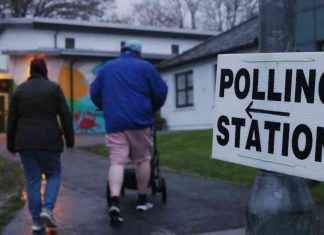Wall Street banks aren’t buying the White House line that tax reform can be OK’d this year.
Even as President Trump on Friday vowed to introduce new details about a tax code overhaul on April 26, major US banks don’t see Congress passing the White House plan before 2018, according to statements by executives and reports put out by the financial institutions.
Wells Fargo, Goldman Sachs, JPMorgan Chase, Citigroup, and Morgan Stanley have all recently voiced doubt on such an aggressive tax overhaul timetable.
Trump’s insistence on pushing for an Obamacare repeal and replacement is getting in the way, the banks said.
“I’m not holding my breath,” Paul Christopher, head global market strategist at Wells Fargo Investment Institute, told The Post on Friday about the passage of tax cuts. “If you want to do health care before tax, we don’t have a plan and you’ve already lost a few months. How are we going to do this this year?”
Last week, JPMorgan CEO Jamie Dimon said that Washington is likely to be consumed with “sausage-making” for the next nine months. He had previously said he didn’t expect that Trump would sign any tax legislation before January.
And Goldman — which has at least a half-dozen alums in the Trump administration — decried the “continued delays” that health care has imposed on the tax reform timeline, according to a note this week.
The pessimism flies in the face of Treasury Secretary Steve Mnuchin, himself a former Goldman banker, who said on Thursday that he hopes passing a tax plan “won’t take til the end of the year” — even though in February he said he wanted to have it done by August.
With a little more than a week before Trump crosses the 100-day mark, there are few details about the Trump tax cut plan — although Mnuchin has said it would be “sweeping.”
One of the key holdups in the tax plan is whether to adopt a 20 percent tax on imports, a hallmark of the House Republican plan that has become increasingly unpopular.
“That’s what the US is complaining that other countries do to us now,” Christopher said. “[Exporting countries] could retaliate against us in any number of ways.”
Morgan Stanley, which also sees little hope for taxes this year, said that some budget hawks have softened their stances, and can live with “deficit expansion” — meaning they’d cut taxes without finding a way to pay for them.
One of the most optimistic outlooks came from Deutsche Bank, which still cautioned investors not to get too excited.
“We continue to see a better-than-even chance of tax reform (at least on the corporate side), though more limited in scope than originally advertised,” Joshua Feinman, chief global economist for the bank’s asset management arm, wrote in an April 17 note.
Our editors found this article on this site using Google and regenerated it for our readers.







